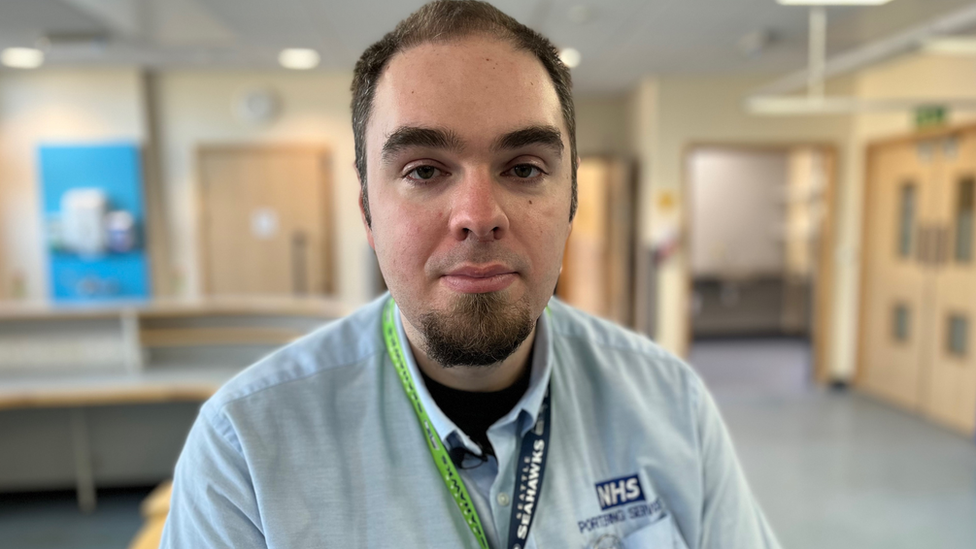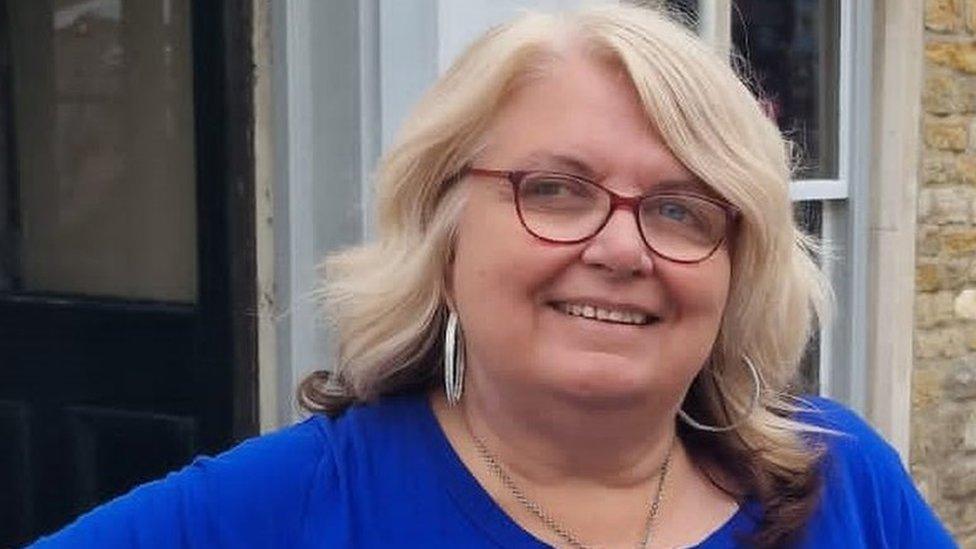Jasbir Pahal: Coroner criticises 'inadequate' stroke care provision
- Published

Jasbir Pahal, 44, had a stroke in the early hours of 13 November 2022 and died just over a fortnight later
A coroner has criticised the availability of emergency stroke care after a woman was not given potentially life-saving treatment over a weekend.
Jasbir Pahal, 44, a teaching assistant from Huddersfield, died in 2022 after having a "massive" stroke at home.
In a Prevention of Future Deaths report, Oliver Longstaff told the NHS that current out-of-hours support for some stroke patients was "inadequate".
NHS England said it was working towards providing consistent stroke care.
An inquest heard that Mrs Pahal, who was described as "passionate" about teaching and "much-loved" by colleagues and children, was a fit non-smoker who did not drink alcohol.
In the early hours of 13 November 2022, her husband, Satinder Pahal, awoke to find his wife on the floor after she had fallen out of bed and was displaying stroke symptoms.
The two-day hearing in Wakefield heard the ambulance arrival time was four times longer than target response times, with a hospital CT scan revealing a blood clot which was suitable for "clot buster" thrombolysis medicine or a procedure called a mechanical thrombectomy.
Her husband was told too much time had passed for thrombolysis to be used, with mechanical thrombectomy locally unavailable outside the hours of 08:00-15:00 Monday to Friday.
"It is undesirable that patients such as Jasbir should be subject to the vagaries of local arrangements when they are in urgent need of potentially life-saving treatment, and that they should be denied access to such treatment simply by reason of their home address," area coroner Mr Longstaff wrote.

Mrs Pahal and her husband Satinder had been married for 23 years when she died
The inquest heard Mrs Pahal was taken in another ambulance to Royal Stoke University Hospital, but the vehicle was later told to divert and went to Leeds General Infirmary instead.
Her family told the hearing that Salford Royal Hospital was 32 miles (51km) away from where she was initially taken to hospital and that site offered a 24-hour mechanical thrombectomy service.
However, the inquest heard that no pathway was in place to automatically take her there.
Mrs Pahal arrived at Leeds General Infirmary approximately nine hours after the original 999 call, and it was there she underwent an operation to reduce swelling on the brain.
However, her health continued to worsen and she died on 30 November.
The coroner reached a narrative conclusion following her inquest, with the medical cause of death recorded as an ischaemic stroke.
In a family statement released to the BBC, Mrs Pahal's family said: "We were let down massively by the people entrusted to provide her care and treatment.
"This is the outcome we sought so that no-one else will have to endure the trauma of trying to find urgent medical attention following a stroke."


What is a thrombectomy?
A thrombectomy is a relatively new procedure used to treat some ischaemic stroke patients.
An ischaemic stroke is caused by a clot cutting off the blood flow to part of the brain and is the most common type of stroke.
The thrombectomy involves the insertion of a clot removal device, through a catheter, to pull or suck out the clot and restore blood flow.
It is able to remove clots which are too big to be broken down by clot-busting drugs.
A thrombectomy is normally only performed up to six hours after symptoms show and it is only suitable for around one in 10 stroke patients.
Source: Stroke Association

In his Prevention of Future Deaths report, Mr Longstaff warned NHS bosses the 08:00-15:00 weekday window for mechanical thrombectomy only covered a fifth of the hours in a week.
"Anyone whose nearest hyper-acute stroke unit is at a district hospital in West Yorkshire and who suffers a stroke outside of these hours does not have access to a thrombectomy service," he writes.
Care providers were set a deadline of 26 January to respond to the report and explain the steps they were taking in order to prevent future deaths.
The Fieldfisher law firm, representing the family, said the coroner's warning and the actions of Mrs Pahal's relatives would "undoubtedly save lives".
NHS England said a third of thrombectomy centres nationally currently offered 24/7 services, with the others "actively working to provide this level of access right across England".
"Our specialist hospitals in Leeds, Sheffield and Hull are progressing plans to ensure appropriate staffing levels are in place with the relevant expertise to deliver 24/7 mechanical thrombectomy services," a spokesperson said.
Dr James Thomas, NHS West Yorkshire Integrated Care Board medical director, said: "We fully support the recommendations that have been identified and we are actively engaged in efforts to enhance access to mechanical thrombectomy services throughout West Yorkshire."

Follow BBC Yorkshire on Facebook, external, X (formerly Twitter), external and Instagram, external. Send your story ideas to yorkslincs.news@bbc.co.uk, external.
Related topics
- Published10 August 2023

- Published2 February 2023

- Published28 July 2022
